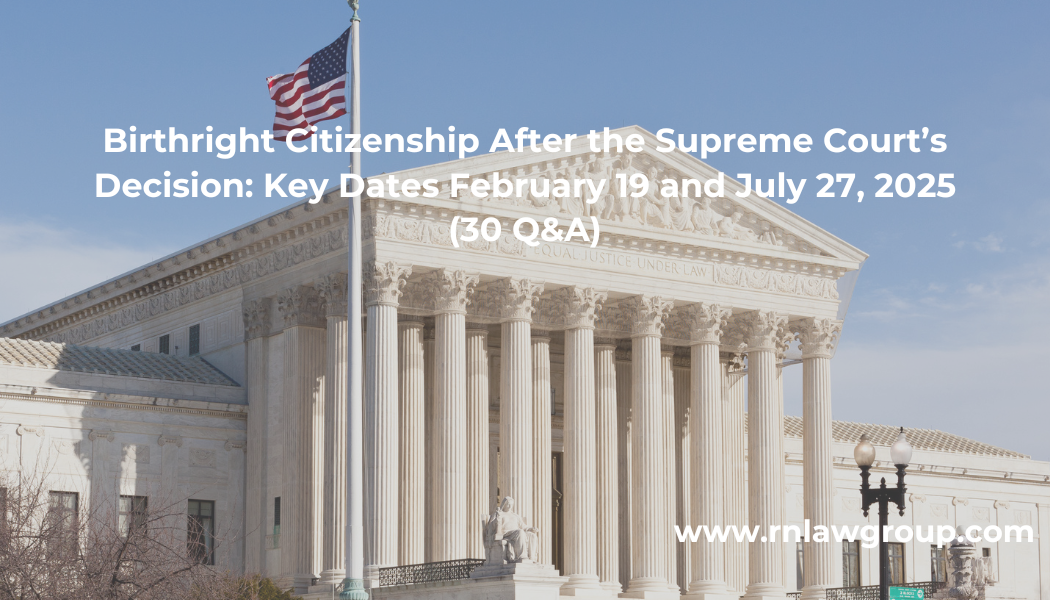
Birthright Citizenship After the Supreme Court’s Decision: Key Dates February 19 and July 27, 2025 (30 Q&A)
- When was Executive Order No. 14160 issued?
January 20, 2025. - Who issued Executive Order No. 14160?
President Donald J. Trump. - When was Executive Order No. 14160 originally set to take effect?
30 days after issuance, specifically February 19, 2025. - What did Executive Order No. 14160 seek to change?
It sought to deny automatic U.S. citizenship to children born in the United States to certain noncitizen parents. - Which children specifically does the Executive Order target?
Children born after the effective date (Feb. 19, 2025) to mothers unlawfully present or temporarily present, and fathers who are neither citizens nor lawful permanent residents. - When was the Supreme Court decision issued on the universal injunction issue related to this order?
June 27, 2025. - Did the Supreme Court decision change the original effective date of the Order?
Yes. The Supreme Court delayed enforcement explicitly, stating Section 2 of the Order will not take effect until 30 days after June 27, 2025—i.e., July 27, 2025. - Why was the original effective date of the Executive Order delayed?
Because lower federal courts issued preliminary injunctions temporarily preventing its implementation. - What exactly did lower courts initially do regarding this Executive Order?
Three separate federal district courts issued preliminary universal injunctions in February 2025, preventing nationwide implementation. - What is a “universal injunction”?
A court order that stops enforcement of a policy against all affected individuals nationwide, not just the parties involved in the lawsuit. - What was the significance of the June 27, 2025 Supreme Court ruling on these injunctions?
The Supreme Court ruled federal courts cannot issue universal injunctions unless specifically necessary to provide complete relief to the plaintiffs. (The Supreme Court did not decide the constitutionality of the Order.) - How does the Supreme Court ruling affect enforcement of Executive Order No. 14160?
It allows the Order to take effect partially after July 27, 2025, only against individuals not already protected by court orders or state-specific injunctions. - Will the Executive Order automatically apply to all states after July 27, 2025?
No. Twenty-two states (including Washington, Arizona, Oregon, Illinois, California, New York, New Jersey, Massachusetts, Maryland, Connecticut, Delaware, Hawaii, Maine, Michigan, Minnesota, Nevada, New Mexico, North Carolina, Rhode Island, Vermont, Wisconsin, and Colorado), plus the District of Columbia and San Francisco, have injunctions protecting them from enforcement. Other states are currently unprotected. - Does a child born in Maryland or Washington on or after July 27, 2025 automatically receive U.S. citizenship?
Yes. Both Maryland and Washington are covered by existing injunctions, ensuring children born there continue receiving citizenship automatically. - Does a child born in Texas or Florida after July 27, 2025 automatically receive U.S. citizenship?
No. Neither state secured injunctions. Unless parents successfully challenge the Order individually or through class action, the federal government will enforce the Order there. - If a child was born between February 19 and July 27, 2025, did the Executive Order affect their citizenship?
No. Those children were protected by nationwide injunctions and the delayed enforcement. Their citizenship remains unaffected. - Can a child born after July 27, 2025, in a non-injunction state obtain citizenship at birth without litigation?
No. Parents would need individual legal actions or to join class-action lawsuits currently being pursued by advocacy groups to secure citizenship. - What can parents in non-injunction states do immediately after July 27, 2025?
They should promptly file lawsuits, request injunctions, or seek to join emerging class-action cases initiated by advocacy groups like CASA or the ACLU. - Can citizenship be restored retroactively if the Order is later found unconstitutional?
Yes. Citizenship can be restored through individual or class-action lawsuits or if the Supreme Court ultimately invalidates the Order. - Is a child born in California after July 27, 2025 affected by the Executive Order?
No. California is among the protected states, having secured an injunction; thus, children born there remain citizens at birth. - Can hospitals still issue standard birth certificates to children born after July 27, 2025?
Yes. Hospitals and states will issue standard birth certificates as usual. However, in non-injunction states, federal agencies will likely not recognize those certificates alone as proof of citizenship. - How does this Order affect passports issued to children born after July 27, 2025?
In states protected by injunctions, passports will still be issued normally. In non-injunction states, the State Department will likely deny passport applications without individual court intervention. - Can children born after July 27, 2025 access Social Security benefits automatically?
Only if born in injunction-protected states. Elsewhere, citizenship documentation (and thus Social Security numbers and benefits) may be delayed or denied unless legal action is taken. - Will the federal government remove or deport babies who are denied citizenship under this Order? (NEW QUESTION)
No, not at this time. The DOJ indicated it will not deport U.S.-born babies covered by the Order while legal challenges remain ongoing. Initial enforcement will involve denial of citizenship documentation rather than deportation proceedings. - How will the federal government track citizenship under this Order after July 27, 2025?
New verification systems will likely be implemented to check parental immigration status, creating additional bureaucracy. Detailed guidance from federal agencies is expected by July 27, 2025. - What if parents of a child born after July 27, 2025 lack resources to challenge the Order legally?
Parents should contact legal aid groups, immigration nonprofits, or join class-action suits organized by advocacy organizations actively mobilizing to support affected families. - Does this Order affect children born to U.S. citizens or lawful permanent residents?
No. The Order targets only children born to specific categories of noncitizen parents. If either parent is a citizen or lawful permanent resident, their child’s citizenship is unaffected. - Could Congress override Executive Order No. 14160?
Yes. Congress could pass a law explicitly affirming automatic citizenship for all U.S.-born individuals, overriding the Executive Order. - Could the Supreme Court ultimately declare Executive Order No. 14160 unconstitutional in the future?
Yes. If the constitutionality issue is explicitly brought before the Court and it rules accordingly, the Supreme Court could invalidate the Order. (The June 27 ruling only addressed injunction scope, not constitutionality.) - What is the next major date families should watch regarding citizenship enforcement under this Order?
July 27, 2025—the date when enforcement of the Order begins unless further legal actions (such as nationwide class-action injunctions or Congressional intervention) provide broader protection.By: Rahul Reddy
Rahul Reddy is the founding partner of Reddy Neumann Brown PC. He founded our firm in 1997 and has over 28 years of experience practicing employment-based immigration. Rahul‘s vast knowledge of the complex immigration system makes him an invaluable resource and an expert in the field. His personal experience with the immigration system has made him empathetic to each of his clients’ cases and empowered him to help others achieve the American Dream.
Rahul‘s dedication to serving the immigrant community is evident, from his daily free conference calls to his weekly immigration Q&As on Facebook and YouTube Live. He is an active member of the immigrant community and one of the founders of ITServe Alliance. He has been a member of American Immigration Lawyers Association since 1995.

